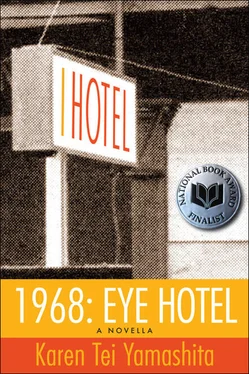“Paul Valéry, a French poet,” Paul commented, mystified as Edmund that this canvas left by his father should be his personal window.
Edmund adjusted his jacket and stuffed the article into its deep pockets. He muttered a partial thought, “The winning civilization—” opened the door, and left.
Authors sometimes take strange liberties.
—Charlie Chan
I
The tradition of all the dead generations weighs like a nightmare on the brain of the living.
—Karl Marx
1.1 She said: Who am I if not the dowager empress, called upon in modern times to weave a brocaded wisdom? Admit it: you step lightly, fearing to see my visage in the carpeted tapestry; you suspect me to be hiding in the wings of every drama; you want to believe my tiny stinking feet and painted peony lips have long decayed, chopped up with my decadent remains, but language recuperates me again and again. I am hidden in a library left behind over time, incrementally established with great care and then abandoned as if its librarian had suddenly escaped. Indeed he fled, left his great collection in this great sitting room overlooking a craggy scene of California cypress framing the stately Golden Gate, a play of red arches in the blue Pacific. Two young men—let’s say his scribes—were left to tend these archives, and in offering his home for their services, they had already begun to assume the robes of their hopeful futures: poet and scholar. Truly a library is a room of dreams.
1.2 Poet: Paul Wallace Lin stretched himself out in the cushioned embrace against one end of the expansive bay window, puzzling over the mind of Monsieur Teste and his creator Paul Valéry. He wondered if his father, who had painted the French poet’s portrait, had ever read Monsieur Teste , and if reading it himself would illuminate his father’s expectations for his son. Even the man who is free of his father’s will desires some direction.
1.3 Scholar: Lee Yat Min, similarly stretched at the other end of the window, did not speculate on his father’s ambitions for his son. After establishing a laundry business, his father sent for the family in China, and when Yat Min arrived in California at age twelve, his father sat him down between the damp steam rising off pressing irons and the reeking shirts stained in sweat and growled very plainly that if Yat Min ever worked in a laundry like this, he’d break his son’s legs. Yat Min learned that the mind can run faster than the legs. He turned the pages of Lu Hsun, running a finger down the printed characters of a story entitled “Diary of a Madman.”
1.4 In such a fashion, two young men framed the sunlit entrance to the library, one seeking to decipher a Western mind and the other an Eastern, only to discover that neither was more inscrutable than the other.
1.5 Now, let us pull away from this great window as if riding the soft fog that creeps into the bay beneath the Golden Gate, and observe the stunning house against the cliffs. Professor Chen Wen-guang designed this custom-built palace for his second wife, a wealthy Austrian baroness. It’s engineered in three split-levels on a hillside beneath Mount Tamalpais, great windows on every level overlooking the San Francisco Bay. On the first level, a dining and living room; on the second level, the library and bedrooms; on the third level, an artist’s studio and gallery. The Baroness lived only briefly in the finished house, Europe and China meeting in cordial feng shui, before she died, leaving a comfortable stipend to her learned and beloved Chinaman.
1.6 Chen Wen-guang modestly insisted that he was but a historian, a witness to events, a chronologer, if such a title exists. In that role, predictably, he created a chronology of those days in turmoil at San Francisco State College as if such a record would create an enlightened path by which to walk through and finally leave behind disturbing events. By such chronology the puzzle of history was stretched out, one factual account stepping after another factual account, moment by moment, day by day, month by month. But upon scrutinizing his own work, he discovered but a single and continuous silken thread pulled away, unraveling at every tug the very fabric of a robe once splashed in calligraphic dreams.
II
When dealing with a man who is capable of understanding your teaching, if you do not teach him, you waste the man. When dealing with a man who is incapable of understanding your teaching, if you do teach him, you waste your teaching. A wise teacher wastes no man and wastes no teaching.
— Confucius (15.8)
2.1 The wise Professor Chen read with great interest a position paper on the establishment of Chinese Ethnic Studies, presented to him by the Intercollegiate Chinese Students Association. He approved of their proposed curriculum in sociology, social psychology, community counseling, and Cantonese language. He supported their argument that eighty-three percent of Chinese in America speak the Cantonese of the streets. But he could not help but notice the absence of the study of mainland China, Taiwan, and Chinese living in Southeast Asia. Even if the students had not forgotten that he was a scholar of contemporary Chinese literature and political thought, they could not see how this learning was connected to their desire to serve the people. There are situations for which a Mandarin’s knowledge is not required.
2.2 Professor Chen resigned his high post as chair. It is the Confucian belief that enlightened intellectuals should naturally conduct the political life of a just government. However, the American egghead is perhaps not such an intellectual.
2.3 Professor Chen applied for his long-delayed sabbatical and accepted a scholar’s invitation to the Sorbonne. In making arrangements for his house, he entrusted its financial upkeep to his student Paul Lin, who had inherited the business of overseeing his father’s properties, and he hired Edmund (Yat Min) Lee as a caretaker in exchange for free rent. The teacher with trusted students is surely fortunate.
III
See Paris, die happy.
— Charlie Chan
3.1 Chen Wen-guang strolled the old Parisian streets where he was born and raised within the formalities and rituals of the Chinese legation in the 1920s. He was a boy of fourteen when he left; the next year, the Germans crossed the Meuse River and bombed and occupied Paris. The boy who returns as a man sees with a boy’s eyes.
3.2 To Paul, he wrote: I heard Charles Mingus at the Palais de Chaillot the other night. Marguerite Duras, whom I happened to meet there, sends her regards. “Paradoxically,” she says, “the freedom of Paris is associated with a persistent belief that nothing ever changes. Paris, they say, is the city that changes least. After an absence of twenty or thirty years, one still recognizes it.” And yet, I am lost in this familiarity.
3.3 Contrary to his questionable recognition and usefulness at his own institution in the United States, Professor Chen was everywhere in Paris, and as they say, the talk of the town. Thus it was proven that a man’s wisdom is rarely appreciated in his own household. His French colleagues wanted to compare student movements. They gave him an office at the Sorbonne, although the school was closed intermittently by student protests. But was this not the case the world over? This was the rise of a new Communist movement inspired by Mao and the Chinese Revolution. And what of China that had so inspired Western Marxists? What did he believe to be Chou En-lai’s possibilities to succeed Mao Tse-tung? What was his analysis of the Cultural Revolution? Of the Russia/China split? How should one predict a revolutionary future? Three steps forward and two steps backwards.
Читать дальше












